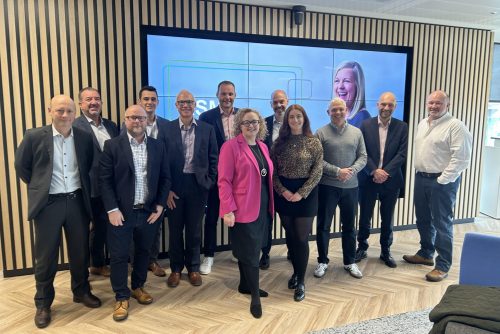Embracing evolution: leading teams through change with confidence

Organisation’s need to treat leadership as a profession, was a key message at a recent roundtable discussion, as leading business figures joined to discuss how teams can be led through change and uncertainty.

As advancements in technology continue to come rapidly, our panellists shared how they are preparing themselves and their teams to stay ahead of the pack.
For James Farrow, director and co-founder of Curium Solutions, there’s a push to see how leaders can “start looking around corners” and planning for the next two to three years ahead.
He said: “Leaders are really struggling with that because they’re constantly waiting for the next crisis.
“If you’re not learning a new skill each year, you’re going to be out of date within 18 months, and that’s why organisations and leaders need to look at this for themselves and everybody in the workforce”.
Farrow believes that leaders do not look at themselves as a leader, but instead “a senior one of them”. He said that the challenge of leadership is that people aren’t studying it as part of their job”.
CEO of Shropshire Council Andy Begley said that “understanding what the assets are around you is a really important part of leadership”.
He said: “My portfolio goes across everything – from housing education, skills, the full cabinet. At the moment my single objective like every other council is to stay financially valuable and that’s really difficult on what is clearly a reducing budget year on year.
“I’ve got a choice as a leader of the council, I can join my colleagues and bleat a lot about conditions and say let’s lobby government a bit more. Personally, I don’t think that works.
“What I’m choosing to do is flip things and see what assets I can use that I can trade, that I can join together and create a different proposition that can create interest, and fund investments in a wholly different way than the public sector normally does”.
Lee Clifford, partner at Freeths believes that leadership has become so “crucial because you have to lead from the front and be in it with your staff.
“Remote working has been a hot topic and I think we’re coming to the other side of this now. But if you, as a leader are sat at home five days a week working remotely, you’re not going to have the reciprocity with the workforce”.
Whilst leading from the front is vital, for Tony Hague, CEO of PP Automation, “you need the right senior leadership team at the right level beneath you.
“If you haven’t got the right people around you, you keep yourself busy, then you don’t invest in recruiting the right people. You’re just locked in a loop that you can’t break out of”.
He also advised the room how important a business coach or mentor can be. Hague said: “You need someone to hold you accountable – point out the obvious. What’s your backswing, hold your feet to the flames. You need someone to ask why are you doing that? Why aren’t you doing this? To gain that other perspective”.
The next generation of leaders is a key focus for the regional office managing partner at RSM, Helen Brocklebank, who brings it back to the question “how do you nurture and train for leadership?
“You might be an engineer, accountant or lawyer but actually the further you get up that ladder you need to be more conscious about what leadership looks like as a business.
“We try to look at leadership at the very earliest stages as people are going through those next stages in the development, whether that’s development assessment centres, or how do we take an associate to a manager to associate director.
“Sat in a completely separate channel along that is those high potential people that we spot that we think are the future leaders, and it very much sets to one side and we consciously looking at those leadership capabilities and what type of leader you could be?”
Global employer Prologis has delved into what the expectations are for Gen Z and Gen X of work. Jason Longhurst, UK head of sustainable investment said manufacturers struggle with this and has therefore completed work on what skills, training and development opportunities are needed to cater to this workforce.
He said: “Every company assumes it’s amazing and so it’s no longer what can I give to the company, there’s been a shift to where’s the value back?
“The clarity of an investable offer, both as the employer and the employee of hedging a mutually beneficial opportunity is so important”.





